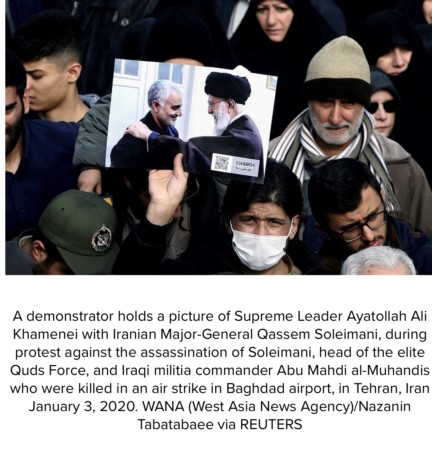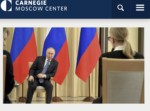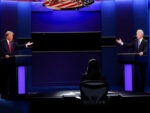The assassination of a top Iranian military official in Iraq on January 2 is the most dramatic step yet in the ongoing escalation between the United States and Iran in the Middle East.
Qasem Soleimani, leader of the Quds force within the Islamic Revolutionary Guard Corps (IGRC), was killed by a US drone strike outside the Baghdad airport, along with other Iraqi militia leaders. The attack comes just days after the United States hit the Iranian-backed group Kata’ib Hezbollah in Iraq and Syria, which led to intense protests outside the US embassy in Baghdad.
US Secretary of Defense Mark Esper said that the “Soleimani was actively developing plans to attack American diplomats and service members in Iraq and throughout the region.” Soleimani and his Quds force has long been accused of supporting terrorism throughout the Middle East and facilitating attacks on US troops in Iraq. According to Esper, the January 2 strike was “aimed at deterring future Iranian attack plans.” The Department of Defense confirmed that the action was authorized by US President Donald J. Trump to specifically target Soleimani.
Iranian foreign minister Javad Zarif accused the United States of an “act of international terrorism” that was “extremely dangerous and a foolish escalation.” A statement by Supreme Leader Ayatollah Ali Khamenei promised a “harsh retaliation is waiting” for the United States.
Iraqi prime minister Adil Abdul Mahdi describedthe attack as “a flagrant violation of the conditions for the presence of the American forces in Iraq.” A January 3 message from the US State Department has urged all US citizens to leave Iraq “due to heighten tensions in Iraq and the region.” Oil prices spiked early morning on January 3 to nearly $70 a gallon on the risk of further conflict between Tehran and Washington.
Atlantic Council experts respond to the killing of General Qasem Soleimani:
William F. Wechsler, director of the Rafik Hariri Center and Middle East Programs at the Atlantic Council:
“The world is a better place with Soleimani dead. But this is a particularly dangerous timing and context. Indeed, given the immediate context it wouldn’t be surprising if we later learn that this operation derived from an emerging target of opportunity for the United States rather than from the culmination of months of planning, a professional weighing of alternatives, and a thorough preparation for the likely consequences.
“It will be rightly seen as a massive escalation by Iran, as a fundamental risky if not reckless act by our friends and allies, and an opportunity by our global geostrategic competitors. The likelihood is very high that Iran will respond violently, which could itself trigger further escalations. We are actively moving from a proxy war to a direct, overt war between the United States and Iran. Of course, nothing would please Moscow and Beijing more than if the United States becomes bogged down in yet another war in the Middle East.
“We should be prepared for Iran to do so across its entire range of asymmetric capabilities, inside Iraq, across the region and elsewhere across the globe where they have active cells. We should also be prepared for their targets to not only be US military and civilian government personnel and facilities, but Americans in general and our allies. Many Americans in the region will be coming home, either at the explicit direction of the US government or on their own. And Iran has already demonstrated a willingness to commit terrorist acts inside the United States when they tried to assassinate the Saudi ambassador by bombing a restaurant in Washington DC.
“We should be actively working with our friends in the region who are much more directly vulnerable to Iranian military action than the US homeland. Particularly vulnerable friends include Israel, Saudi Arabia, Bahrain, and the UAE.
“This action significantly raises the probability that Baghdad will tell the United States to withdraw its military forces from Iraq, which will also likely eventually require us to pull forces from Syria. A potential combination of US withdrawal after striking a match that lights the region aflame once again would deeply undermine long-term US interests in the region. However, whether by design or not, that combination may be attractive to many Americans—as long as Iran is not successful in committing terrorist acts that make Benghazi pale in comparison.
“The US Congress will want to move quickly to understand the Trump administration’s decision-making process on this and its legal rationale. The last time the Trump administration came close to striking Iran (in the wake of the Iranian downing of our drone) the internal process to develop, analyze and decide on a course of action was deeply flawed, indeed dangerously so.”
Barry Pavel, senior vice president, Arnold Kanter chair, and director of the Scowcroft Center for Strategy and Security at the Atlantic Council:
“The US strikes tonight were an overdue response to a series of recent major Iranian aggressive actions— the attack on the Saudi oil facilities, seizing of tankers, downing of the US drone— that were unanswered— until now.
“Now, the killing of Soleimani is likely to elicit a significant Iranian response— Iran will escalate horizontally (think terror attacks vs US citizens personnel/interests in other countries including Europe) as well as directly in the region.
“US strategy should seek to deter Iran’s response and de-escalate the crisis. After all, the real strategic prize of the 2020s will be continuing to deter a great-power conflict with China. And there is nothing that China (and Russia) would like more than for the US military to become embroiled in another military conflict in the Middle East that bleeds the US dry.”
Barbara Slavin, director of the Future of Iran Initiative at the Atlantic Council:
“The US decision to assassinate Soleimani was audacious and extremely risky. US diplomats and military personnel around the world will now need to be on guard against retaliation. Iraq, with a fragile caretaker government, will be further destabilized. The 2015 nuclear deal, which was hanging by a thread, will be another casualty and any prospect for US-Iran negotiations are dead for the foreseeable future.”
Matthew Kroenig, deputy director of the Scowcroft Center for Strategy and Security:
“I will not shed a tear for the leading terrorist in the world’s leading state sponsor of terror. But Iran will almost certainly look to retaliate. So the key question is: what should the United States do next? The answer is Washington should seek to deter major retaliation by making it clear to Tehran that they will suffer much more from a major conflict. If Iran seeks a calibrated and delayed response, the crisis could de-escalate.”






Leave a Reply